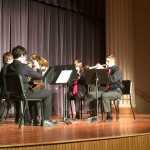Why do we educate young musicians? What is the philosophy behind our daily routine? I think so often we meander down the same hallway or drive the same drive to work stuck in a rut that is driven by habit instead of intention. Why are we actually doing what we are doing and how is it benefiting our students. . . .and us?
We have the same schedules, the same concerts and the same educational experiences everyday which in turn can drive us to be complacent and bored. If we as educators become bored and tired then most certainly the student will reflect the same feelings. I think we can become stale and sterile in our techniques and offerings without even knowing it. Life gets in the way. We get busy and pushing the limits educationally takes time, mental energy and further education. Then we think these thoughts to ourselves . . . .”I wish I had a better studio,” ” I wish I had more students,” “I wish I had a more successful band program,” etc. Well, there is a way but doing things the same way over and over and expecting different results is the actual definition of INSANITY.
It can be scary to think that if we spend less time working on concert literature and offer more varying musical experiences, our students will actually be more proficient at the concert literature. Let me try to explain.
For example: Most band directors rehearse their band music over and over and also add after school rehearsals because they cannot quite get the music learned in the time alotted during the school day. The problem is not the time, its the engagement of the student. Because the student is bored with the same thing over and over, they are engaged less than 50% of the time they are in rehearsals. Because of this, it takes 50% more rehearsal time and drives the director crazy to get things accomplished. The same can be true for private lesson instructors. Because of the recitals and exams, teachers feel pressure to teach for the test and the student becomes bored and lacks enjoyment practicing the material. Adding varying experiences to your daily educational routine will provide more enjoyment, more variety and keep the brain engaged and growing. The concert material will improve faster by spending less time working on THAT specific material. That is hard to believe I know. . . .but it’s true!
What are the varying experiences?
They are different for each instructor and each situation but it could look like the following:
1. Creating a chamber ensemble program that thrives and works as consistently as the actual band. These experiences can happen certain days of the week during the band class to break up the “same old” band rehearsal, and to provide new sight-reading experiences and enasembles without conductors.
2. Implement improvisation into private lessons and/or music class. It doesn’t neccessarily mean jazz improvisation, but getting the student to be more creative and learn to bring the passion and musicality out without being “stuck” behind the page. Let them learn the fun and excitememt from creating their own musical product.
3. Bring professional players in to work with your students. Do not be afraid of not knowing everything, or not be able to provide your students with everything. Showing humility and knowing weaknesses will help strengthen the core program by filling those voids. One cannot be expected to be proficient on every instrument. As a music educator, give your kids the opportunity to learn from the best players that are actively doing it on a daily basis. Have those players work with your chamber ensembles, do masterclasses and get students excited about the possibilities on their instrument.
4. Take field trips to hear professional concerts. Get your students excited about all different kinds of music. Talk to them about the experiences and why you feel the importance of each trip. What are you trying to gain by the experience?
5. Perform more often and more music with less rehearsal. Make the students (and the educator for that matter) feel a bit uncomfortable with the lack of “spoon-feeding” and put the responsibility on the student to do well because of their individual responsibility.
6. Take a day out of class for a performance day. Have students prepare solos, or bring in a CD they love and let them talk to the class about what they love about it and the history of it.
Think outside the box. Enjoy the daily education with your students and the possibilities are endless.
These are just a few experiences but each requires just a bit more thought. Each requires the educator to take a different daily route, to self educate and be more prepared.
Do you have another experience that might be great to implement as a music educator?











